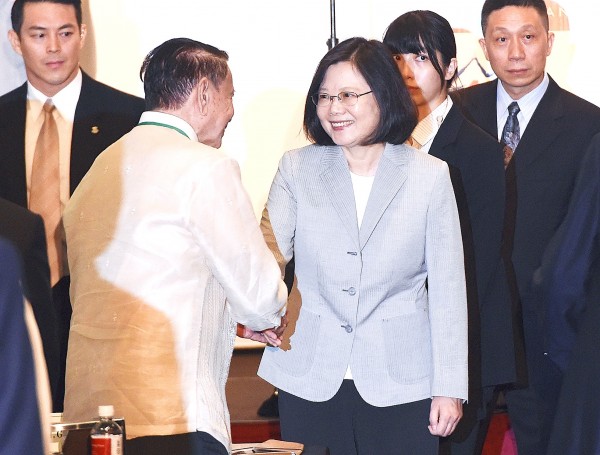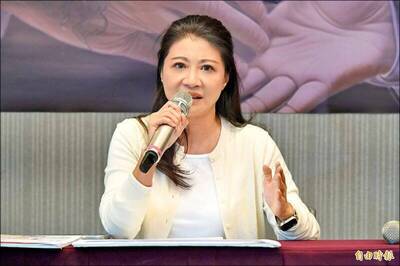《TAIPEI TIMES》 Tsai gives pledges at Yushan Forum
2017/10/12 03:00
President Tsai Ing-wen, center, shakes hands with former Philippine vice president Teofisto Guingona Jr yesterday at the opening of the Yushan Forum in Taipei. Photo: Liao Chen-huei, Taipei Times
INTEGRATION: Changes to the region’s economic, social and political situations are bringing new opportunities and challenges, so Taiwan must adapt, the president said
By Lee I-chia / Staff reporter
President Tsai Ing-wen (蔡英文) yesterday announced five flagship programs and five commitments aimed at strengthening regional cooperation and development with countries in the New Southbound Policy at the opening of the first Yushan Forum (玉山論壇) in Taipei.
The “Yushan Forum: Asian Dialogue for Innovation and Progress,” organized by the government opened yesterday at the Grand Hyatt Taipei.
The forum was created as a platform for regional dialogue on society, culture, technology and youth engagement, and focuses on bolstering economic, social and cultural ties between Taiwan and the Asian-Indo-Pacific region, Prospect Foundation chairman Mark Chen (陳唐山) said.
Tsai told forum attendees that the rise of Asia has profoundly influenced both international security and the world economy, and that nations included in the New Southbound Policy have some of the fastest growing economies in the world.
“Taiwan has always played an indispensable role in the development of Asia. Over the years, we have been a source of capital, technology and technical know-how,” she said, adding that the nation has also built up enduring economic and industrial links with Southeast Asian countries, as a leading source of foreign direct investment and trade.
Economic, social and political changes in the region are bringing new opportunities and challenges, so Taiwan must adapt, redefine its role and play an even more active and prominent part in the interactions of the region, Tsai said.
“The New Southbound Policy is our new ‘Regional Strategy for Asia’ which is aimed at deepening and broadening our presence in South and Southeast Asia,” she said. “One of our foremost objectives is to strengthen cooperation in resources, talent and market development.”
The policy is inclusive and does not come at the expense of other regional initiatives, Tsai said, adding that it is designed to complement, rather than compete with, the Regional Comprehensive Economic Partnership Agreement, China’s “One Belt, One Road” initiative and the India and Japan Freedom Corridor.
Taiwan has expanded scholarships and financial assistance for students from New Southbound countries, is encouraging more bilateral trade and investment through the establishment of six investment windows in Southeast Asian countries and India, and relaxed visa restrictions on several countries covered by the policy, Tsai said.
In the past year, tourist numbers have increased by 36.7 percent, trade has grown by about 20 percent, and overseas student numbers have increased by about 10 percent from New Southbound countries, Tsai said.
The next phase is the five flagship programs, directed at development in five major areas: Human resources, innovation-based industries, regional agriculture, medical cooperation and industrial supply chains, she said.
To fulfill the region’s needs and bolster its sense of inclusiveness and community, Taiwan is prepared to make five commitments to New Southbound countries, Tsai said.
The commitments include helping nurture and empower talents needed in the region, by providing scholarships and educational opportunities and expanding work-study course offerings to 5,000 students each year, and sharing experiences to help New Southbound countries establish domestic demand-driven industries, such as in the fields of petrochemicals, information and communications technology, and the medical sector, she said.
Other commitments include helping New Southbound countries with their infrastructure and major development projects by establishing a US$3.5 billion fund managed by the Official Development Assistance program; and helping small and medium enterprises and nongovernmental organizations (NGOs) share their insight and experiences with New Southbound countries, with an emphasis on job creation at the local-level, Tsai said.
The nation has also made a commitment to join forces with other like-minded countries to improve Taiwan’s common presence in the region, which would benefit peace, stability and prosperity in the region and the world, she said.
Tsai said that a “Taiwan-Asia Exchange Foundation” would be established to act as the main organizing and administrative body of the Yushan Forum and serve as an exchange platform for leaders, youth representatives, NGOs and think tanks in the region.
The two-day forum has two sub-themes: “Partnership of Commitment” aimed at highlighting Taiwan’s commitment to the New Southbound Policy, and “Partnership for Connectivity,” which demonstrates how Taiwan’s vibrant civil society is connected with people and groups for social well-being in Southeast and South Asia.
The forum invited more than 40 speakers from 15 South and Southeast Asian countries, as well as Japan, South Korea, the US and Europe.
新聞來源:TAIPEI TIMES










